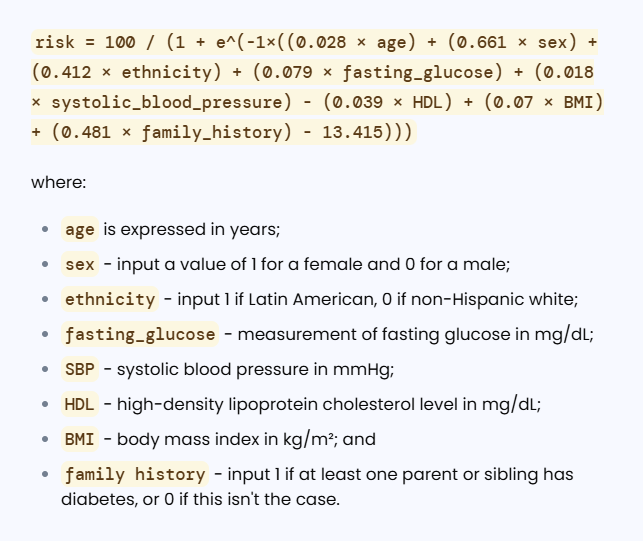1. What is a Risk of Diabetes Calculator?
Definition: This calculator estimates the risk of developing diabetes in the next 7.5 years as a percentage, based on various health factors, including a calculated BMI from height and weight, using a statistical formula.
Purpose: It helps users assess their likelihood of developing diabetes, enabling them to take preventive measures or seek medical advice.
2. How Does the Calculator Work?
The calculator takes several health-related inputs, calculates BMI from height and weight, and computes the risk of diabetes using the following formulas:
- BMI Formula:
- \( \text{BMI} = \frac{\text{weight (kg)}}{\text{height (m)}^2} \)
- Risk Formula:
- \( \text{risk} = \frac{100}{1 + e^{-(-1 \times ((0.028 \times \text{age}) + (0.661 \times \text{sex}) + (0.412 \times \text{ethnicity}) + (0.079 \times \text{fasting_glucose}) + (0.018 \times \text{systolic_blood_pressure}) - (0.039 \times \text{HDL}) + (0.07 \times \text{BMI}) + (0.481 \times \text{family_history}) - 13.415))}} \)
- Inputs:
- Age (years)
- Sex (1 for female, 0 for male)
- Ethnicity (1 for Latin American, 0 for non-Hispanic white)
- Fasting Glucose (mg/dL)
- Systolic Blood Pressure (SBP) (mmHg)
- HDL Cholesterol (mg/dL)
- Height (cm, m, in, ft)
- Weight (kg, lb)
- Family History (1 if at least one parent or sibling has diabetes, 0 otherwise)
Unit Conversions:
- Height: cm, m, in, ft (1 m = 100 cm, 1 in = 0.0254 m, 1 ft = 0.3048 m).
- Weight: kg, lb (1 lb = 0.453592 kg).
Steps:
- Input your age, sex, ethnicity, fasting glucose, systolic blood pressure, HDL cholesterol, height, weight, and family history of diabetes.
- The calculator computes your BMI from height and weight.
- Compute the risk percentage using the formula.
3. Importance of Risk of Diabetes Calculations
Calculating the risk of diabetes is useful for:
- Health Awareness: Identifies individuals at higher risk, encouraging early intervention.
- Preventive Measures: Prompts lifestyle changes (e.g., diet, exercise) to reduce risk factors like high BMI or blood pressure.
- Medical Guidance: Provides a basis for discussing risk with healthcare providers for personalized advice.
4. Using the Calculator
Examples:
- Female, 50 years, Latin American, Fasting Glucose 100 mg/dL, SBP 130 mmHg, HDL 50 mg/dL, Height 1.65 m, Weight 80 kg, Family History Yes:
BMI: \( \frac{80}{1.65^2} \approx 29.38 \, \text{kg/m}^2 \).
Risk: \( \frac{100}{1 + e^{0.1104}} \approx \frac{100}{1 + 1.1168} \approx 47.24\% \).
- Male, 40 years, Non-Hispanic White, Fasting Glucose 90 mg/dL, SBP 120 mmHg, HDL 60 mg/dL, Height 70 in, Weight 150 lb, Family History No:
Height in m: \( 70 \times 0.0254 = 1.778 \, \text{m} \).
Weight in kg: \( 150 \times 0.453592 \approx 68.0388 \, \text{kg} \).
BMI: \( \frac{68.0388}{1.778^2} \approx 21.52 \, \text{kg/m}^2 \).
Risk: \( \frac{100}{1 + e^{3.8586}} \approx \frac{100}{1 + 47.368} \approx 2.07\% \).
5. Frequently Asked Questions (FAQ)
Q: What does the risk percentage mean?
A: The risk percentage represents the likelihood of developing diabetes within the next 7.5 years, based on your current health factors.
Q: How accurate is this calculator?
A: The calculator uses a statistical model based on population data. While it provides a good estimate, individual risk may vary, and you should consult a healthcare provider for a comprehensive assessment.
Q: Can I reduce my risk of diabetes?
A: Yes, you can lower your risk by managing factors like BMI (through diet and exercise), controlling blood pressure, improving HDL cholesterol, and monitoring fasting glucose levels.
 Home
Home
 Back
Back
